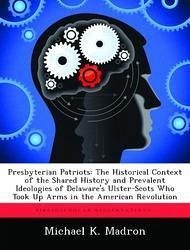This monograph examines the phenomenon of the disproportionate volunteerism of members of Delaware's Presbyterian Ulster-Scot community in the sole Regiment from Delaware to join the Continental Army. It posits Ulster-Scots represented a majority of the officer corps in Continental Regiment for two main reasons: shared cultural history of tyranny by the British, and an ideology that supported the concept of rebellion. This ideology was formed through the two main philosophies: republicanism and liberalism. Both of these ideologies supported and justified rebelling in philosophical terms, and supported their cultural antagonism to the British. This monograph asserts that the members of the Regiment came to know republican and liberal ideological perspectives as a result of two related venues: universities and churches. As members of Presbyterian congregations, the members of the Continental Regiment would have been exposed to, understood, and internalized the main concepts of republicanism and liberalism. These two aspects add context to the Regiment's motivation to fight, and provide lessons for modern military planners concerning combat planning and post-conflict governance by offering an example of the fidelity required for 'cultural understanding'; of opposing forces.








